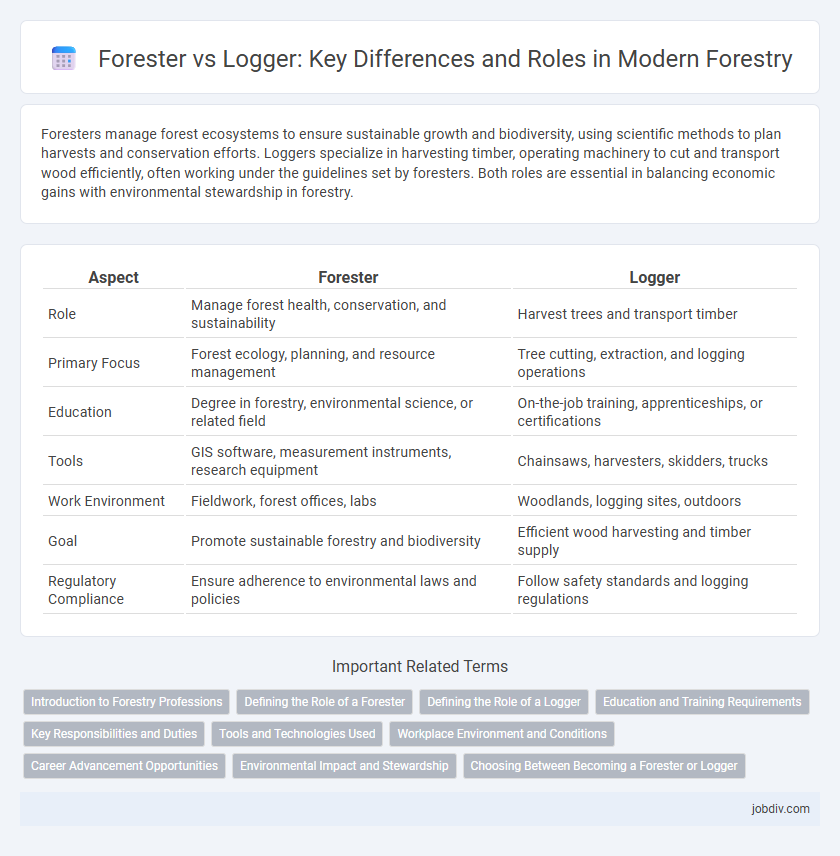Foresters manage forest ecosystems to ensure sustainable growth and biodiversity, using scientific methods to plan harvests and conservation efforts. Loggers specialize in harvesting timber, operating machinery to cut and transport wood efficiently, often working under the guidelines set by foresters. Both roles are essential in balancing economic gains with environmental stewardship in forestry.
Table of Comparison
| Aspect | Forester | Logger |
|---|---|---|
| Role | Manage forest health, conservation, and sustainability | Harvest trees and transport timber |
| Primary Focus | Forest ecology, planning, and resource management | Tree cutting, extraction, and logging operations |
| Education | Degree in forestry, environmental science, or related field | On-the-job training, apprenticeships, or certifications |
| Tools | GIS software, measurement instruments, research equipment | Chainsaws, harvesters, skidders, trucks |
| Work Environment | Fieldwork, forest offices, labs | Woodlands, logging sites, outdoors |
| Goal | Promote sustainable forestry and biodiversity | Efficient wood harvesting and timber supply |
| Regulatory Compliance | Ensure adherence to environmental laws and policies | Follow safety standards and logging regulations |
Introduction to Forestry Professions
Foresters manage forest resources by planning, conserving, and monitoring ecosystems to ensure sustainability and biodiversity. Loggers operate machinery to harvest timber efficiently while following safety regulations and environmental guidelines. Both roles are essential in the forestry sector, contributing to wood production and ecosystem health.
Defining the Role of a Forester
A forester manages forest resources by planning sustainable harvesting, conservation, and reforestation efforts to maintain ecological balance and promote biodiversity. Foresters conduct assessments of tree health, soil conditions, and wildlife habitats, integrating scientific data to create long-term forestry management plans. Their role emphasizes environmental stewardship and sustainable resource use, distinguishing them from loggers who primarily focus on the physical cutting and removal of timber.
Defining the Role of a Logger
A logger is a skilled professional responsible for cutting down trees, transporting timber, and preparing logs for processing in the forestry industry. Unlike a forester, who manages forest growth, sustainability, and conservation, a logger focuses on the operational aspects of timber harvesting. Efficient logging practices are crucial for maintaining forest health while meeting commercial demands.
Education and Training Requirements
Foresters typically require a bachelor's degree in forestry, environmental science, or a related field, with coursework in ecology, silviculture, and forest management, while loggers often enter the profession through on-the-job training or vocational programs focused on operating heavy machinery and safe tree harvesting techniques. Foresters may also pursue certifications such as the Society of American Foresters' Certified Forester credential to demonstrate professional expertise, whereas loggers benefit from safety certifications like OSHA training to ensure compliance with industry standards. Education for foresters emphasizes long-term forest sustainability and ecosystem health, contrasting with loggers' practical skills oriented towards timber extraction and operational efficiency.
Key Responsibilities and Duties
Foresters manage forest ecosystems by planning and implementing sustainable practices, conducting timber inventories, and ensuring conservation of wildlife habitats. Loggers specialize in harvesting trees, operating machinery to cut, transport, and process timber efficiently and safely. While foresters focus on long-term forest health and policy compliance, loggers execute the physical labor of timber extraction.
Tools and Technologies Used
Foresters rely on geographic information systems (GIS), remote sensing technology, and specialized software for forest inventory and management planning, enabling precise data analysis and sustainable resource allocation. Loggers typically use chainsaws, harvesters, skidders, and forwarders to safely and efficiently cut and transport timber. The combination of modern digital tools employed by foresters and heavy machinery utilized by loggers reflects the distinct roles and expertise within forestry operations.
Workplace Environment and Conditions
Foresters typically work in office settings and outdoor environments, conducting field assessments and managing forest resources with a focus on sustainability, often facing variable weather and rugged terrain. Loggers primarily operate in physically demanding, hazardous conditions within forests, handling heavy machinery and cutting timber in remote locations, where safety risks such as falling trees and equipment accidents are prevalent. Both professions require adaptability to outdoor elements, but foresters have a more balanced mix of office and fieldwork, while loggers spend most of their time in intensive manual labor under challenging environmental conditions.
Career Advancement Opportunities
Foresters typically have greater career advancement opportunities due to their involvement in sustainable forest management, policy development, and environmental conservation, often requiring a degree in forestry or natural resources. Loggers usually advance through hands-on experience and skill development, but their roles remain more operational, focusing on timber harvesting and equipment management. The potential for transitioning into management or supervisory positions is more pronounced in forestry careers compared to logging.
Environmental Impact and Stewardship
Foresters prioritize sustainable forest management by implementing practices that promote ecosystem health, biodiversity, and soil conservation, minimizing environmental degradation. Loggers focus on timber harvesting, often emphasizing efficiency and economic gain, which can lead to habitat disruption and increased carbon emissions if not managed responsibly. Effective collaboration between foresters and loggers enhances environmental stewardship by balancing resource extraction with long-term forest regeneration and conservation goals.
Choosing Between Becoming a Forester or Logger
Choosing between becoming a forester or a logger depends on your interest in forest management versus hands-on timber harvesting. Foresters focus on sustainable planning, ecosystem health, and conservation, often requiring a degree in forestry or environmental science. Loggers engage in physically demanding work, operating heavy machinery to harvest timber, with emphasis on safety and efficiency in the field.
Forester vs Logger Infographic

 jobdiv.com
jobdiv.com